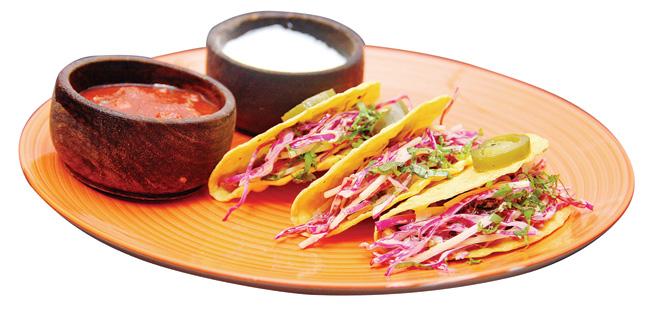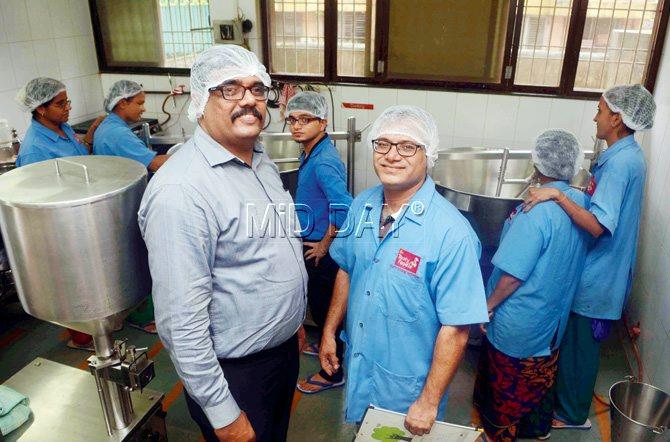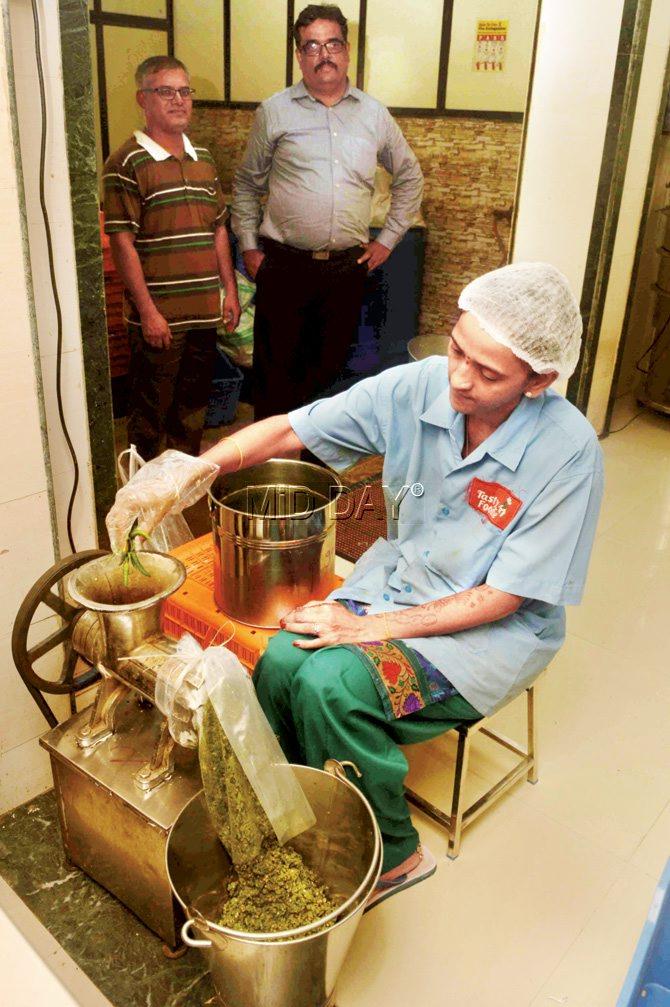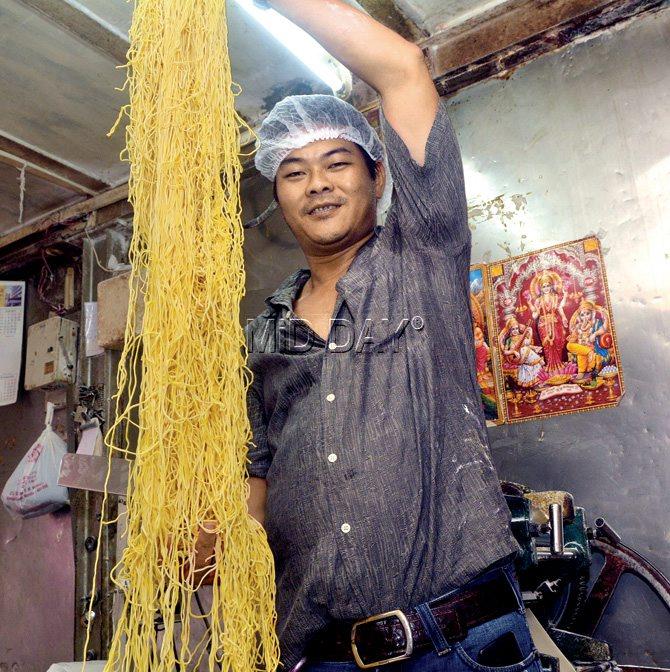In Mumbai’s food-supply chain, restaurants are continuously seeking vendors they can trust to provide them with indispensable accompaniments, be it chutneys, dips or masalas

Staples of Mexican cuisine, tacos and salsa, are supplied by Joy Products to Mumbai's leading lounges and restaurants.
ADVERTISEMENT
That guacamole taco you just bit into at your favourite live gig bar may not have been made in
its kitchen. In Mumbai’s food-supply chain, restaurants are continuously seeking vendors they can trust to provide them with indispensable accompaniments, be it chutneys, dips or masalas.
But it is not just the supporting actors that are outsourced; sometimes, the hero of the main course, including hakka noodles, are also made in a remote manufacturing unit. It’s quite the standard practice, actually.

Staples of Mexican cuisine, tacos and salsa, are supplied by Joy Products to Mumbai’s leading lounges and restaurants. Pic/Sharad Vegda
Chef Rakesh Talwar says the restaurant business is one where you can’t survive without the other. It’s better to call it an ecosystem. “By outsourcing, a restaurant gets readymade products inside its doors.
It reduces the need to hire more in-house staff and saves time taken to make a large batch of order.” Talwar, who owns a series of restaurants including the award-winning O:h Cha, remembers how he doled out batches of hummus to high-end restaurants 20 years ago. “I also made and supplied pita breads, brownies and gooey chocolate cake,” he adds.
Working closely with vendors, who rarely come with culinary education, chefs often customise their wares — tweaking the shape, altering the size, changing the flavour — to meet the requirements of the restaurant. “The challenge for restaurants is to get vendors, the backbone of the hospitality industry, to try out new trends,” he says.

Tanuj Gandhi intoduced taco shells to his business in 1986
Mexican Tacos and Nachos
By Tanuj Gandhi
TANUJ Gandhi’s foray into catering in 1983 was a humble one. When he tried adding to his income by starting a small business of frozen spring rolls, sandwich spreads and pizza base. In 1986, while it was still early days for Mumbai to go Mexican, Gandhi introduced taco shells into his repertoire. This move coincided with the launch of a swish new Mexican restaurant in South Mumbai, and word-of-mouth got Gandhi introduced to its American chef.

Nilesh Ozarkar (above left) and Ravindra Durve at their vada pav masala unit in Kalyan (below) A staffer grinds masala at Tasty Foodie. Pics/Atul kamble
Thirty years later, Gandhi’s Joy Products is a prominent supplier of the ABCs of Mexican fare to bars and restaurants. From his Goregaon unit, Gandhi now goes beyond taco shells and caters 30 products, including nachos, tortilla chips, enchiladas, refried beans, smoked green salsa and cheese sauce. If you are throwing a Mexicana inspired banquet, then 60-year-old Gandhi will have you covered.

The cost of, say, 100 taco shells from Joy is about R600. Supplying to over 60 outlets in Mumbai and Navi Mumbai, Gandhi believes that customisation is key to the business. “We make taco shells as small as eight anna coins to those that are four inches in diameter. If a restaurant wants gluten-free nachos, or chocolate tacos or multi-grain tostadas, we’ll have them made.” The other factor that drives this business is brand loyalty. “People are used to drinking at their favourite bar. Similarly, chefs need to gel with their suppliers.”
His only challenge now is to beat the corn harvest googly. “The raw-material of all Mexican food is corn, and there is no scientific approximation of quality of corn. Poorly stored corn can affect my tacos,” he says.
Noodles
By Allan Tan
THE TAN family is of Chinese origin but born and raised in Mumbai. This makes them the perfect lot to manufacture noodles for Mumbai’s multiplying Chinese eating joints. The business, set up by his father Tan Wing Tung in 1982, is being carried on by 34-year-old Allan Tan, who now supplies noodles to 80 eateries between Colaba and Mira Road. But, that’s not all. Noodles from Tan’s Tardeo unit are sought after by royalty in Udaipur and beach-revellers in Baga, Goa, he says.
And Tan knows his noodles. “Dry noodles are sun-dried or dehydrated in an oven. That’s not the case with instant noodles, which are first dipped in oil and then dried. Notice how you never need to add oil while making instant noodles?” he asks.
hying away from the instant variety, Tan, who is Cantonese, manufactures the essentials of Chinese cuisine — noodles (steamed, raw, dry, flat, wheat, multi-grain and so on), wanton wrappers and spring roll sheets — under the brand Hong Kong Noodles, named after the city his forefathers came from. “My knowledge of noodles is hereditary. But my father used to know how to make noodles by hand, which I don’t. Now we just use machines.” Tan marvels at the simplicity of the process, since “all you need to make noodles is salt, water, maida and eggs. And, if we are talking eggless, then it’s down to just three ingredients.”
His hakka noodles are ever popular, while coloured noodles, made using fresh vegetables, not artificial colour, are a novelty. Selling at between R50 and R100 per kg, these include what Tan claims are the thinnest noodles in town. “If I eat Chinese at a restaurant, I can tell by the size of the noodles if they came from my unit.”
Vada Pav Masala
By Nilesh Ozarkar and Ravindra Durve
The next time you are in Kalyan and bite into a vada pav from Sawant Snacks, they will tell you that the fiery red masala comes from Nilesh Ozarkar and Ravindra Durve’s Tasty Foodie Network. Tasty Foodie supplies a variety of pre-mixes including chutneys and masalas, and instant mixes of dhokla and idli to fast-food joints, sweet shops and caterers across Mumbai, Surat, Hyderabad and Bangalore.

Allan Tan supplies noodles to 80 eateries from Colaba to Mira Road. Pic/Sayed Sameer Abedi
The experience of running a college canteen in Karjat taught the pair that eateries take a hit due to errant cooks. “Ready masalas were the answer to reducing our dependency on irregular cooks,” says Ozarkar, 46, who launched Tasty Foodie with Durve in 2009 to manufacture masalas for vada pav, pav bhaji, missal and shev bhaji at their Kalyan unit. Their star product, the vada pav masala that carries a kick of garlic, is priced at R250 a kg and is enough to accompany 250 vada pavs. That’s one rupee for a spoonful of the potent masala.
“It’s all about choosing the best ingredients,” says Ozarkar. “It’s about opening a gunny bag full of ginger and taking in a strong whiff to test if it’s fresh. It’s about figuring from experience that last month’s onions are better for the masala than the new ones that will arrive in the market next month.” Since the masala’s key ingredients include garlic, ginger and chillies, Ozarkar says the powder can even dress up a drab aloo paratha.
 Subscribe today by clicking the link and stay updated with the latest news!" Click here!
Subscribe today by clicking the link and stay updated with the latest news!" Click here!







